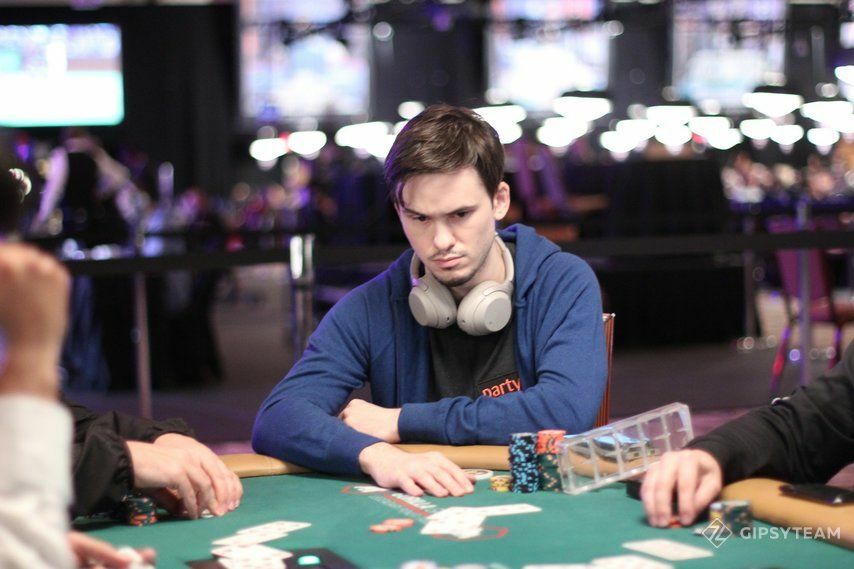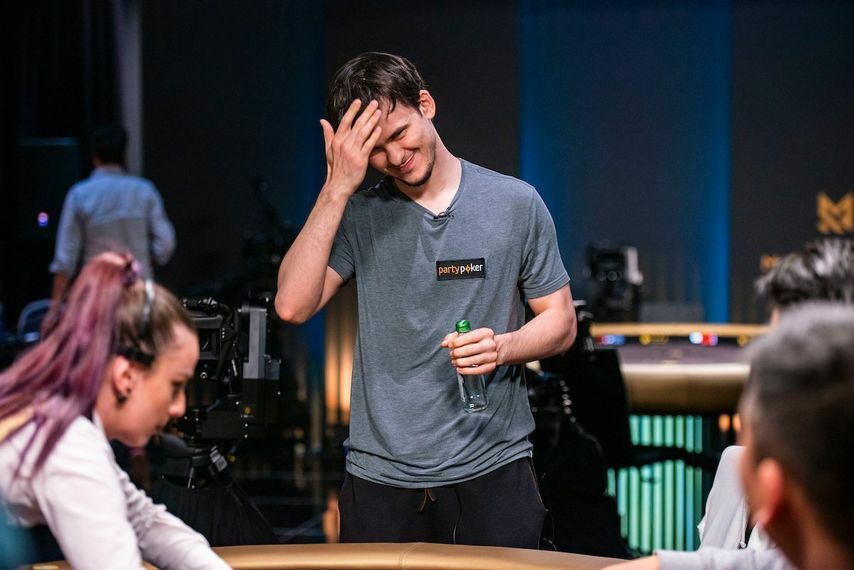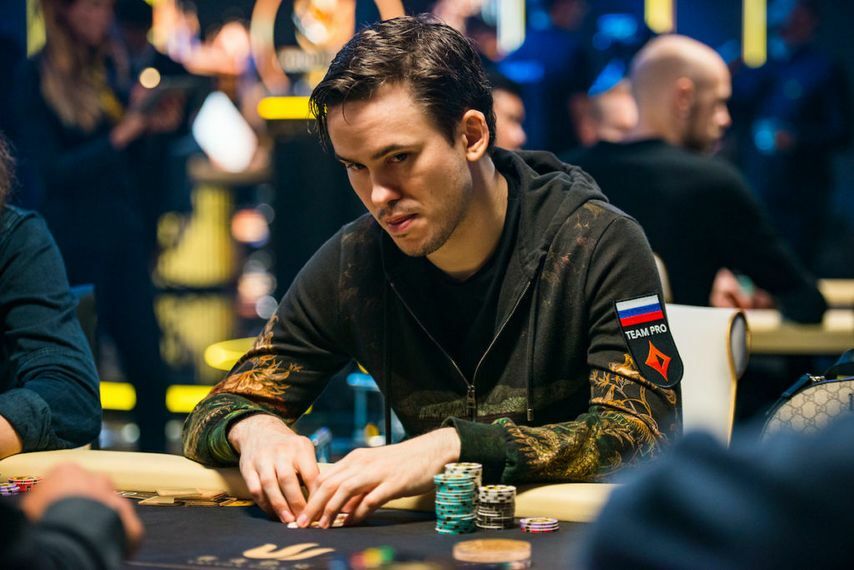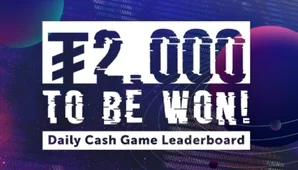Editor's Note: This interview took place in March of 2021.
– You've just finished heads-up with Mikael Türitz, you've been playing quite a lot lately. Tell us a little about this match.
– Playing a $100/$200 NLHE/PLO mix for several days without a crossbook. They just decided to play big bet in their circle of dinosaurs, and not against the solver generation. For practice and for fun.
– In general, how are you with poker action lately?
– I haven't played much in the last few months. From a career point of view, I paid more attention to trading. I played only on GGPoker, when an expensive game of Hold'em, Omaha, and even short deck was going there several times. And there was nothing at all on Stars.
– Is there no suitable game, or is poker in general not so interesting to you anymore?
– Both this and that. I don't want to play very expensive stakes. There is also no desire to specifically deal with theory in order to play heads-ups, like Viktor and Stefan. In terms of quality of life, I am no longer ready to play heads-up for eight hours a day, the EV from this will not be very high.
– Is it theoretically possible for you to become interested in some kind of long-term duel? Maybe in 8 games against Sulsky again?
– Now it will be even more difficult to organize it than when we discussed it at the forum. I'm doing too well in trading, and I like playing poker less than a year ago.
– Hypothetically, such a match would require your full focus.
– Yes, and it’s even hard for me to imagine under what conditions it would be interesting.
– Would you be able to immediately jump into the action or would it take some time to prepare?
– I could break in right away, but another question is, would I be plus EV? And the answer is most likely no. I mean active players, it is somewhat optimistic to expect that I will play in the plus without swinging. But Sulsky himself has been without action for several years. I fully admit that we will play with him again sometime. But for now, I have no desire to chain myself into some kind of long match, to compete and find out something.

– By the way, do you know why Sulsky stopped playing? Forced retirement, like Raul, with whom they simply stopped playing?
– Yes, he was no longer given action in the varieties that he wanted to play. Nobody played heads-ups with him at all, even Berri stopped playing Omaha. I sometimes played 8 game, but also irregularly and took long breaks, so it didn’t make much sense to stay.
– In an interview with Lee Davy, you said that you started playing online because your friend won $7k in a couple of months. Can you tell me who it is? Are you still in touch?
Yes, we keep in touch. He also won a lot of money playing poker. He even wrote something on GipsyTeam, nickname "pyjamas" or something like that, and on Stars – Vaterguy. Now he still plays sometimes, but he lost interest in poker much earlier than me.
– Did you study together?
– Yes, still at school, in the same class.
– You said several times that at the beginning of your career, you did not experience emotions at all, but how did this affect your psychology? Were there any problems with this as well?
– Not certainly in that way. I think I even wrote that in the first month, there was a session when I tilted my entire bankroll for four tables of Omaha. Later, this was almost non-existent. And even in the first year of my career, tilt did not really affect the quality of my game. We can say that the emotion of anger is quite familiar to me, even too much. At least that was the case at the time, now I'm a little out of the habit of anger. And before, there was nothing new in this, my usual state, so I was not too surprised at the tilt.
– Did you analyze later what it was connected with?
– I was about 19 years old then, I was not very satisfied with my life and was disappointed in my studies at the university. I was very closed, almost did not pay attention to communication, and in general, was not a very conscious person regarding some of my problems and so on. Now all this has changed a lot.
– How did it affect poker? For the game, you probably also preferred to work on your own.
– Yes, for the most part, I did everything myself, only occasionally discussed some strategy with Vaterguy. This continued for the first two or three years.
– In your blog post, you wrote that CTS' book Let There Be Range had a huge impact on your entire career. Can we say that this was your first poker tutorial?
– It has accelerated the development of my thinking in ranges a little. I would have figured out how it works anyway, but the book and then Galfond's VODs gave a tangible impetus.
– Did you buy a licensed one for big money?
– Haha, no. My bankroll was $1,000 and it was worth $2,000. I downloaded a pirated one somewhere.
Was it really ahead of its time?
– Yes, it was written almost in 2008, at that time it was a real revelation.
– You also talked about how you suddenly came to understand the correct preflop plays. Do you remember how other regs reacted to changes in your game?
– In the chat, some were indignant that I was defending the big blind very loosely. Apparently, they perceived this as disrespect on my part. But then there was a lot of action in general, everyone was hacking at each other, and I also played heads-up all the time. It is unlikely that I was considered an outright fish, although it’s hard to say because I didn’t communicate with anyone then.

– It was about this period that you talked about in Inner's podcast that you woke up and immediately started playing.
– This period lasted for six years. Not immediately, but rather quickly – when I started playing $25/$50 and winning a lot. It lasted until 2017, then I started to take some breaks, but in 2018-19 I played a lot again.
– Did you enjoy playing that much? It is unlikely that this was due only to the desire to earn all the money in the world.
– I liked to play, but I also wanted to win a lot. More precisely, there was nothing that I wanted to buy more than a new watch with my new money. But I was haunted when there was an opportunity, as it seemed to me, to make money easily, but I did not do it. That is, he was missing a simple opportunity that may no longer exist.
– Raul cited you and Jungle as an example of the fact that you used to be able to move up to high stakes quickly because, at the middle stakes, you were just giving away money. Was it really like that?
– Giving is a relative concept. Then there was less information, and if you quickly figured it out, you could get a big advantage. I went up to $25/$50 in a year, Jungle is about the same. I went up in capped games and only played a bit with a full stack in the middle of the way.
– Caps were much more profitable?
– For me, yes, the full stack did not work out so well. Early in my career, I played very well pre-flop compared to the field, and post-flop I was overly loose-aggressive. And in caps, it didn't cost me much in terms of bb/100, but in deep stacks, it was already quite painful.
– Tell us about the first solver. You said that you bought it in 2013 for $100k, Raul and other players around the same time for $200k. Was it different software?
– No, the same one. We bought everything from one person, just different deals – Raul teamed up with several players, and I was alone.
– You have probably been offered a frank scam more than once. How do you know if it's useful? Was it already clear to you then that there is an optimal game in poker?
– Yes, there were completely inadequate proposals, such as taking software that costs $3 million, I didn’t seriously consider this. And the fact that in poker there is a strategy that corresponds to the Nash equilibrium, I realized as soon as I started playing. Even before solvers appeared, in some of the simplest spots, I just figured out on a piece of paper what the Nash equilibrium would be like. Conditionally on the river, this is not very difficult to do. Then Oleg appeared and offered to buy a program that calculates the balance itself. I replied: Oh! Cool, come on.
– Was it absolutely open information among the high-stakes regs then?
I don't think so. I had the software, Redbaron too, Ike, I suspect, since 2011 – he, Sauce, and Ben [Tollerene] – their American group. It is clear that information did not go beyond these groups because it is not beneficial to anyone. Surely someone refused to buy but was aware that such software exists.
– And the work in the software immediately paid off?
– I was pretty lazy back then. I worked out only until the moment I was convinced that I had some kind of advantage, and quit. And it was possible to work further and disperse the advantage. But I became uninterested. Naturally, such knowledge gives an advantage. How big is hard to say. Decent, but not endless.
– Did you also master the limits with the help of software? Like 2-7?
– For 2-7, some software was sold in the public domain. But then I didn't play much anymore.
– So you learned everything yourself?
– Specifically, at 2-7, for some time I studied the sessions of Isildur. I took shares from him and watched his game. He played purely on intuition and practice, but he did it well and I mastered some basic things thanks to him.
– You probably read the revelations of Raul, he wrote that you talked quite a lot. Is this a friendship or was it a working relationship? Did you also meet Forhayley around the same time?
– I definitely didn’t perceive it as just a working relationship, it’s still quite an emotional contact. We talked a lot with both Forch and Raul, not only about poker.
Editor's Note: Forhayley is a Russian high roller who climbed from the ranks of NL25 to the nosebleeds. He also has a popular Russian blog.
– Tell me, how did you meet Forhayley, given your closeness?
– By that time, I had already developed a certain development. I was completely withdrawn in 2010, and we started communicating with Forch only in 2013, by that time I had already communicated with a fairly large number of poker players. And on the 14th, I went to play live in Macau. I don’t remember exactly, but I probably wrote to Forhu, a fellow poker player, first on Skype. I started reading his blog and it became interesting to get to know each other.
– How much were you interested in poker-related news then? Let's say did you know the WSOP winners?
– Haha, the World Series has never really interested me. In the first years of my career, I didn’t follow anything at all, then I began to look at something, but also not too fanatically.
– Maybe mentioning your nickname?
– Well, yes, if some articles were published on Gipsy, I looked at who wrote what, what comments they left, and so on.
– Was there something that you strongly disliked and hurt?
– To some extent, the negative, of course, hurts everyone. Even if you understand that this is a relatively anonymous person, it is still not pleasant for anyone to read some nasty things to themselves. Djokovic was recently interviewed and asked how he reacts to the fact that the press is against him, and there are some specific detractors of journalists. He said no one would like that. I don't compare myself to him, but it's true. I doubt that there is a person who does not care about comments.
– In Misha's podcast, you said that you did not go out in public for a long time, because you thought that it could harm the game. Do you have counter-examples when someone's interview or post helped you against this player?
– Yes, I have several such examples, but I am not ready to share them. I saw situations when people describe their emotions about certain actions, and then you can pretty accurately guess in which direction they deviate in terms of frequencies. Understandably, I was overprotective of my strategy at the time, but let's just say it's not entirely unfounded. Probably, few people watch other people's interviews so carefully, but sometimes you can get useful information from them.
– Did Forch’s blog harm him in any way? He conducted it quite frankly and honestly.
– Yes, he was not cunning in anything, but he did not write things that could harm him too much. In my opinion.
– Do foreign journalists often turn to you for interviews? The same Joe Ingram?
– He got in touch, but for a long time I almost always refused, and people usually do not want to ask many times in a row. And to be honest, I'm not too interested in doing a podcast with Joe.
– Don't you get the feeling that in poker the level of content makers and journalists in general doesn't usually correspond to what they write or talk about? Especially when it comes to high stakes.
– If a person does not make value judgments about the quality of actions in hands, I don’t see any problems in this at all. But when some kind of analysis begins, then the discrepancy between the expertise of the author and the player can look funny.
– Were you offered any contracts before the Partypoker? Did you have a substantive conversation with Full Tilt in the midst of your expensive games?
– They had contracts with explicit action players – Hansen, Dwan, and Isildur. It was as if there was an unspoken rule that you had to be negative in order to be offered a contract. I don’t think that they were interested in me, and I myself never looked for something like that, I didn’t want to do it. Perhaps I would have thought if they had offered something specific. But, apparently, they didn't look for me too much either.
– And what is the situation with Party now, you don’t have a contract with them anymore?
– Probably not. I don’t even know for sure, because Rob and I just agreed to cooperate and shook hands, we didn’t even sign anything. We agreed for a year and nothing more was discussed about this.

How closely do you follow the internet now? I don't mean only Limitless matches, but the high-stakes world in general.
– What is happening on Stars, I don’t know at all, there is no idle interest in who holds the lobby for PLO $25/$50. I look when there are some big games on GG or in Chinese apps. I suspect that there will be a lot of action when live starts again.
– It's no longer a secret that there were several players whom you helped, the same Sergey "Vedevas" Lebedev. Have you ever turned to others for help?
– Contacted more than once. Sometimes it was successful, sometimes I was denied. I don't want to go into details, but it was about games that are different from Hold'em. When I studied limit games, it's no secret that at the initial stage, Sasha Kostritsyn helped me for some time, and then we became friends with Roma Itzhaki and started working together.
– A little earlier, you spoke about Isildur, so watching someone play can also be useful?
– We called him up, and he explained his actions. I took shares from him and at the same time wanted to learn. That was when he played 2-7 with everyone.
– Didn’t he ask you to do something to help him with Hold’em in return?
– I myself offered him help with some games, but he was not interested. It seems to him that he always knows everything better than others. I'm not exactly sure what he was thinking, but I realized that he was very stubborn and not ready to change his point of view.
– You said that in the middle of your career, you began to experience tilt again and had to deal with it. And how did tilt manifest itself and in what ways did it fight?
– I worked out with Tendler for several sessions, and he helped change my attitude in terms of mood. Because before that, I was too demanding of myself: Why the hell am I tilting? We have to stop right now. This approach doesn't help much. And if you understand that you are tilting now, and you know what caused this state, then it becomes easier to interact with it.
– Do you immediately understand when you start to tilt and what caused it?
– No, not always, but often it can be assumed quite accurately. The first step is to admit that you are tilting and stop asking yourself to stop doing it in the next second.
– And how did tilt manifest itself?
– The game deteriorated, and at different times, sometimes I began to play passively, but more often too aggressively.
– Tell us about your acquaintance with Viktor.
– He then played, it seems, $10/$20, that is, already quite large. I was at a series in Monaco, chatting with friends, and he came up to us and introduced himself. I didn’t know anything about him at all, that was before he became more or less famous. Then a situation arose that a very good game appeared in Macau, and I wanted to put some strong online players there. They called Viktor with friends and eventually, we became friends.
– That you became friends, I suspect, everyone understood when you recently came to the forum. You didn't have many moments when you appeared in public. Why didn’t he restrain himself in the situation with Stefan?
– It's just that there was a rather one-sided display of the situation. And it seems to me that Stefan behaved ugly when, in an obvious upstreak, he tried to kick the opponent even harder, moreover, on an audience that was already rooting for him. But I also admit that I cannot have an objective view here, since it was directed against my friend.
– Do you have any financial interest in their match?
– A very small share, just to cheer. Not even from the match itself, but from crossbooks.
– I want to ask about Berri again. You spoke in detail about him when we talked in Sochi a year ago. Now Raul remembered him again. It seemed that Berri nullified him, if not financially, then emotionally. What is the secret anyway? Raul himself did not seem to understand this.
– Poker is a rather complicated game, and it is obvious that Raul did not see all the sides where you can get an advantage. Berri is one of the best players in the world, especially heads-up. But he is a rather isolated and closed person. I don't know how he works on the game, it will all be guesswork. However, it is quite difficult to imagine that significant progress outside of the sessions is possible without programmatic training. Now there is nowhere to play 8 games so that he can quietly play with someone and level up.
– Can we say that Berri is Isildur at maximum speed? That is, immense talent multiplied by diligence and work.
– I wouldn't say that, Berri has been playing poker for a hundred years, longer than me and Raul. And lately, he's been playing really hard, he's won a lot of money over the years. At the same time, he himself stopped playing with Sauce, he is also in the red against me.
– Did he go against you?
– In 8 games, he lost quite a lot to me, I think he doesn’t want to play with me anymore. We also played in NL/PLO, but there I was already in the red and quit.
– Recently you took part in several shows, how do you like this experience?
– It was fun. I liked Night Poker, and it was cool in 100 to 1, but this show hasn't aired yet. Some variety. Grandma will watch me on TV and be pleased.
Editor's Note: 100 to 1 is a popular Russian TV show based on Family Feud.
– Did the organizers of American shows, for example, High Stakes Poker contact you?
– There were conversations once. But it's not very convenient when I'm in Moscow and I'm offered to play two sessions in Vegas in the middle of the month. There is no great desire to fly for the sake of it and then immediately return back. The time zones are completely different.
















